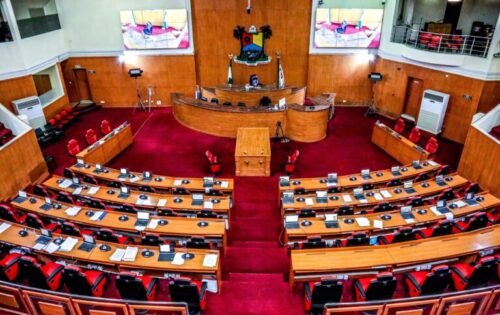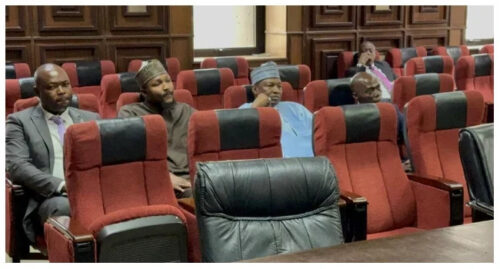Operators within the real estate industry have supported a recent statement by the Chairman of the Economic and Financial Crimes Commission, Ola Olukoyede, who revealed that the majority of Abuja’s upscale residences are owned by civil servants rather than politicians.
Speaking (with The Punch), the President of the Association of Housing Corporations of Nigeria, Eno Obongha, emphasized that home ownership should be legitimate and free from corruption.
He stated, “First and foremost, this is an informed report based on the investigation carried out by the relevant agency. According to the findings, there were three separate investigations of that nature, each supported by documentary evidence.
At first, it was alleged that N33bn was missing from the ministry, but after a detailed review, the actual unaccounted amount was found to be N3bn, with the alleged involvement of some ministers. There’s nothing wrong with stating the facts as they are.
“While we support the idea that every citizen has the right to own a house, it must be emphasised that such ownership must be lawful. If a property was acquired through fraudulent means or linked to criminal conduct, then a proper investigation must be carried out. Where wrongdoing is established, the law must take its full course. We cannot defend criminality under the guise of promoting home ownership.
“A crime remains a crime, whether committed in daylight or under the cover of night and whether the individual is a politician or a civil servant. That said, our broader objective is to ensure that we encourage people to own homes legally and sustainably. This is why we emphasise the importance of mortgage systems. The current mindset that one must first raise millions of naira to purchase a three-, four-, or five-bedroom house outright is problematic. Instead, we need to promote a housing culture that allows people to save and gradually pay for their homes through structured mortgage plans.”
He noted that the situation has been revealing, underscoring flaws in the government’s regulatory and institutional mechanisms.
“Clearly, we are lacking in effective oversight and checks and balances. Strengthening these systems is essential if we are to make real progress in ensuring accountability, transparency, and the promotion of lawful home ownership,” he said.
Olukoyede, the EFCC chairman, recently stated that the ownership of luxury homes in Abuja is largely dominated by civil servants, not politicians, indicating potential corruption and unlawful wealth accumulation.
Similarly, Jeremiah Akinsele, Chief Executive Officer of Magnificent Choice Services Project and Engineering Ltd, remarked, “My main concern here is the approach to fighting corruption, especially when it is deeply embedded in the system. It’s not a simple task. As the chairman rightly pointed out, no minister can single-handedly misappropriate funds because they do not have direct access to the money.
“There are permanent secretaries, directors, and other civil servants involved in the process. In fact, many of the luxurious houses in Abuja are owned not by politicians but by civil servants. Unfortunately, no one seems to be questioning this or tracing the source of their wealth.”
He went on to say, “One major challenge is the absence of proper documentation systems, which is something institutions like the World Bank are currently advocating to improve. The goal is to change how we register and track properties.
“In many cases, property records are incomplete or manipulated, often using numbers instead of names, making it difficult to trace actual ownership. This loophole makes it almost impossible for the government to effectively combat corruption in the property sector.”
The EFCC chairman had earlier revealed via his verified X handle that Nigeria’s civil service includes some of the most corrupt individuals in the nation. He noted that most of the high-end properties in prestigious Abuja areas such as Asokoro and Maitama are not owned by business tycoons or politicians, but by civil servants whose official income cannot justify their affluence.
“Statistics have shown, and we have evidence to prove, that most houses in Asokoro and Maitama are owned by civil servants,” Olukoyede stated.
Asokoro and Maitama are regarded as elite districts in Abuja, catering to the wealthy and powerful. According to Olukoyede, the dominance of civil servants in these neighborhoods underscores how deeply rooted and lucrative corruption has become within the public service.
Olukoyede disclosed that one EFCC investigation into a federal ministry uncovered the theft of N33.7bn. Surprisingly, only N3bn was traced to the minister involved, while an astonishing ₦30.7bn was linked to senior civil servants such as directors of finance, procurement, and administration.
He said, “This is the shocking truth Nigerians must wake up to. The volume of money stolen by establishment people, the so-called career civil servants, far exceeds what most politicians have stolen.
“From our investigation, it is clear that politicians cannot steal without the active collaboration of establishment insiders. Political appointees come and go, but these civil servants remain embedded, powerful, and often untouchable.”
When asked why these findings haven’t been widely shared or the perpetrators exposed, Olukoyede explained that EFCC’s actions are driven by verifiable evidence. He noted that stolen assets are frequently funneled through real estate, accounts belonging to children, or associates, complicating the investigation process—though not making it impossible.
“In several cases, the suspects confessed. They didn’t even deny ownership of the funds or properties once we presented them with documentary evidence. If they had tried to blame the minister or political leadership, we might have treated them as accessories. But they owned up because the evidence was overwhelming.”
Olukoyede emphasized that despite public and media attention often focusing on politicians, the real power behind large-scale corruption lies with entrenched civil servants—those within the system who have turned public office into a tool for personal gain.
“The civil service has become a shadow government where fortunes are syphoned off the national treasury behind closed doors, and unless we confront this head-on, Nigeria will continue to bleed,” he warned.
He also criticized the private sector, describing it as “just as rotten” as the public sector. He stressed that corruption thrives across both sectors, often through coordinated efforts between government insiders and corporate players.
According to him, the commission is enhancing its methods—tracking illicit funds, monitoring real estate transactions, and analyzing financial trails. The goal, he said, is to break the grip of institutional corruption from within.
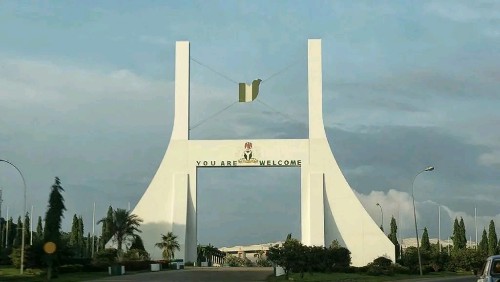

 BIG STORY5 days ago
BIG STORY5 days ago
 BUSINESS3 days ago
BUSINESS3 days ago
 ENTERTAINMENT2 days ago
ENTERTAINMENT2 days ago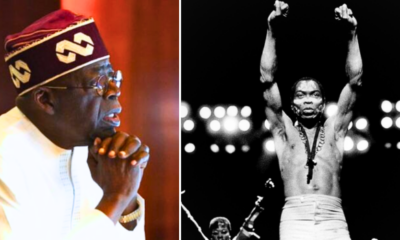
 ENTERTAINMENT2 days ago
ENTERTAINMENT2 days ago
 BIG STORY17 hours ago
BIG STORY17 hours ago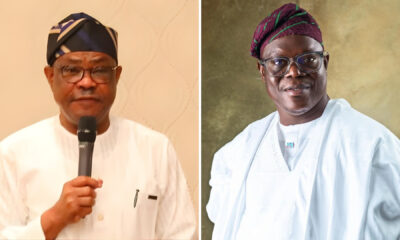
 POLITICS5 days ago
POLITICS5 days ago
 BIG STORY5 days ago
BIG STORY5 days ago
 BUSINESS2 days ago
BUSINESS2 days ago


















